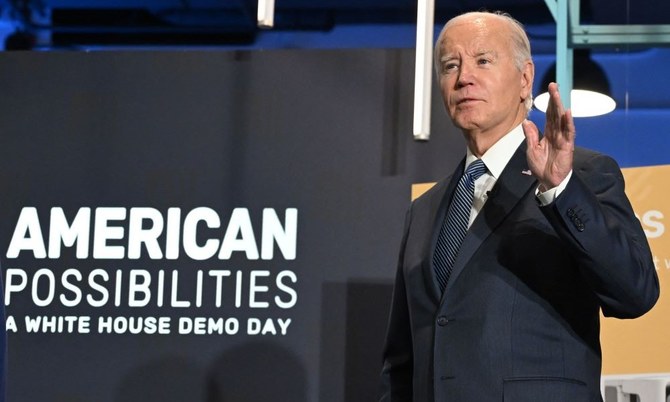
December is proving a tumultuous month for US President Donald Trump, not least with the latest government shutdown adding to political uncertainty in Washington. With attention turning to 2019, focus is growing on the emerging Democratic presidential nomination battle, which could see the largest field of candidates for the party in a generation.
In the near term, the single biggest decision that will shape the race could come as soon as January, with former Vice President Joe Biden announcing whether he will run for a third White House bid after running in 1988 and 2008. He has promised a decision in the first few weeks of the year, after visiting more than 30 states in 2018.
While Biden could yet surprise many in Washington by not putting his hat in the ring, he is the early favorite. This despite him being 76 years old, in what could ultimately become the first ever clash of septuagenarian Democratic and Republican candidates in US history if Trump, 72, seeks re-election too.
Although the first nomination contest in Iowa on Feb. 3, 2020, remains over a year away, a slew of new polls indicate Biden’s frontrunner status. For instance, one taken from Dec. 10-13 for the Des Moines Register, CNN and Mediacom put Biden at 32 percent among Iowa voters. A survey for Focus on Rural America from Dec. 10-11 put him at 30 percent. To put this in context, no other candidate reached even 20 percent in either poll.
Yet he would potentially face a significant field, including the man some are claiming to be the “new Obama,” Beto O’Rourke, the congressman who in November’s Senate election nearly became the first Democrat to win a state race in Texas since 1994.
O’Rourke came in third place in the Des Moines Register / CNN / Mediacom poll with 11 percent, trailing behind not just Biden but also Sen. Bernie Sanders, who scored 19 percent. In the Focus on Rural America survey, O’Rourke secured third place with 11 percent, with Sanders on 13 percent.
While the circumstances of 2020 will be different from 2016, when Clinton and Sanders were engaged in a protracted fight, it is nonetheless the case that another divisive Democratic nomination contest would probably only benefit Trump if he is the Republican nominee again.
Andrew Hammond
Among the potential other contenders for the Democratic crown are US senators Kamala Harris, Elizabeth Warren, Kirsten Gillibrand, Cory Booker, Tim Kaine and Amy Kobuchar. Outside the Senate, potential runners include New York Gov. Andrew Cuomo, actress and TV celebrity Oprah Winfrey, businessman Michael Bloomberg and former Secretary of State John Kerry. While it is widely presumed that Hillary Clinton, the 2016 Democratic presidential nominee, will not run again, she has not categorically confirmed this.
While the Democratic race is fluid, Biden (who would in 2020 be the oldest presidential nominee in US history) may yet consolidate his early position to become his party’s standard bearer. While he is not a prohibitive favorite yet to secure the nomination in the way Clinton was at this stage in 2016, by numerous benchmarks he has key advantages against other Democrats, if his good health remains.
The past few decades of US political history indicate that the victor in nomination contests for both major parties frequently leads national polls of party identifiers on the eve of the first presidential nomination ballot in Iowa, and also raises more campaign finance than any other candidate in the 12 months prior to election year.
From 1980 to 2016, for instance, the eventual nominee in around half the Democratic and Republican nomination races contested (that is, in which there was more than one candidate) was the early frontrunner by both of these measures. Moreover, in at least four partial exceptions to this pattern, the eventual presidential nominee led the rest of the field on one of the two measures.
On both the fundraising and national poll measures, Biden could become the clear favorite for the Democrats in 2020, so much so that some other potentially first-class candidates may decide not to even enter the race.
Presuming Trump seeks re-election and wins the 2020 Republican nomination, which would be probable but by no means certain, he could face a very tough race against Biden or whoever the eventual Democratic nominee is. One of the key factors that will influence the latter party’s prospects of defeating the Republicans will be whether, and how quickly, it can unite around its own nominee given the potentially large number of contenders.
While the circumstances of 2020 will be different from 2016, when Clinton and Sanders were engaged in a protracted fight, it is nonetheless the case that another divisive Democratic nomination contest would probably only benefit Trump if he is the Republican nominee again. Indeed, should Trump emerge easily as the Republican nominee in 2020, this may prove a tipping point in another tight general election contest.
Andrew Hammond is an associate at LSE IDEAS at the London School of Economics
Disclaimer: Views expressed by writers in this section are their own and do not necessarily reflect Arab News" point-of-view












